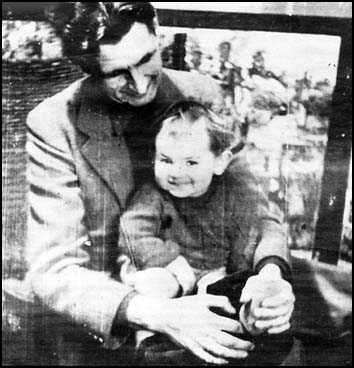George Orwell Islington 1946

|
“There is a photograph, taken around 1946 in Islington, of Orwell with his
adopted son, Richard Horatio Blair. The little boy, who would have been around
two at the time, is beaming, with unguarded delight. Orwell is holding him
gently with both hands, smiling too, pleased, but not smugly so – it is
more complex than that, as if he has discovered something that might be worth
even more than anger – his head tilted a bit, his eyes with a careful look
that might remind filmgoers of a Robert Duvall character with a backstory in
which he has seen more than one perhaps would have preferred to. Winston Smith
“believed that he had been born in 1944 or 1945 . . .” Richard Blair
was born May 14, 1944. It is not difficult to guess that Orwell, in
1984,
was imagining a future for his son’s generation, a world he was not so much
wishing upon them as warning against. He was impatient with predictions of the
inevitable, he remained confident in the ability of ordinary people to change
anything, if they would. It is the boy’s smile, in any case, that we
return to, direct and radiant, proceeding out of an unhesitating faith that the
world, at the end of the day, is good and that human decency, like parental
love, can always be taken for granted – a faith so honourable that we can
almost imagine Orwell, and perhaps even ourselves, for a moment anyway,
swearing to do whatever must be done to keep it from ever being betrayed.”
(xxv-xxvi)
Thomas Pynchon –
Foreword to George Orwell:
"1984"
|